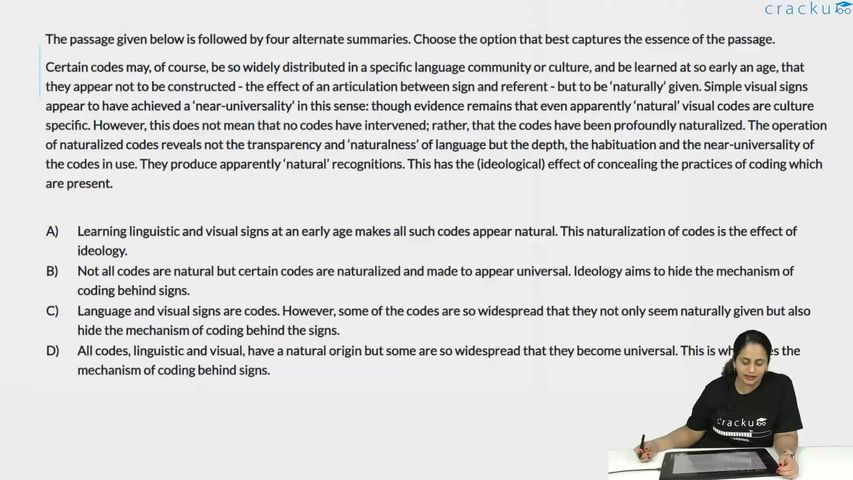Sign in
Please select an account to continue using cracku.in
↓ →
The passage given below is followed by four alternate summaries. Choose the option that best captures the essence of the passage.
Certain codes may, of course, be so widely distributed in a specific language community or culture, and be learned at so early an age, that they appear not to be constructed - the effect of an articulation between sign and referent - but to be ‘naturally’ given. Simple visual signs appear to have achieved a ‘near-universality’ in this sense: though evidence remains that even apparently ‘natural’ visual codes are culture specific. However, this does not mean that no codes have intervened; rather, that the codes have been profoundly naturalized. The operation of naturalized codes reveals not the transparency and ‘naturalness’ of language but the depth, the habituation and the near-universality of the codes in use. They produce apparently ‘natural’ recognitions. This has the (ideological) effect of concealing the practices of coding which are present.
Option C is the correct answer.
This option captures the main idea of the passage that some codes, like language and visual signs, are so commonly used that they appear natural and conceal the process of how they were created.
Option A: The passage does not suggest that early learning is why codes appear natural. The cause-and-effect relationship is incorrectly stated here.
Option B: This option misinterprets two key aspects of the passage. First, the idea that certain codes are "made to appear universal" is somewhat misleading because the passage doesn't claim that codes are deliberately made universal; instead, it describes how codes, through habituation and widespread use, come to feel "natural". Second, the phrase "Ideology aims to hide the mechanism of coding" is not supported by the passage. The passage suggests that the naturalization of codes leads to the illusion of transparency and naturalness, which conceals the mechanisms of coding, but it doesn't explicitly discuss ideology as a force that intentionally hides these mechanisms
Option D: This option is incorrect because the passage doesn’t claim that all codes have a natural origin. It states that codes become naturalized through use, not that they were naturally originating from the start.

Click on the Email ☝️ to Watch the Video Solution
Create a FREE account and get:
Educational materials for CAT preparation